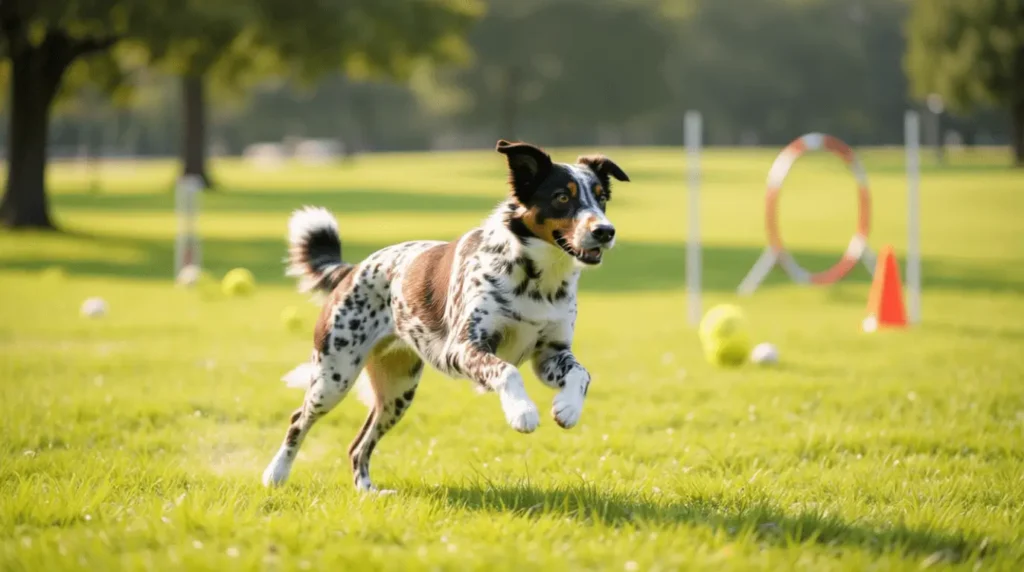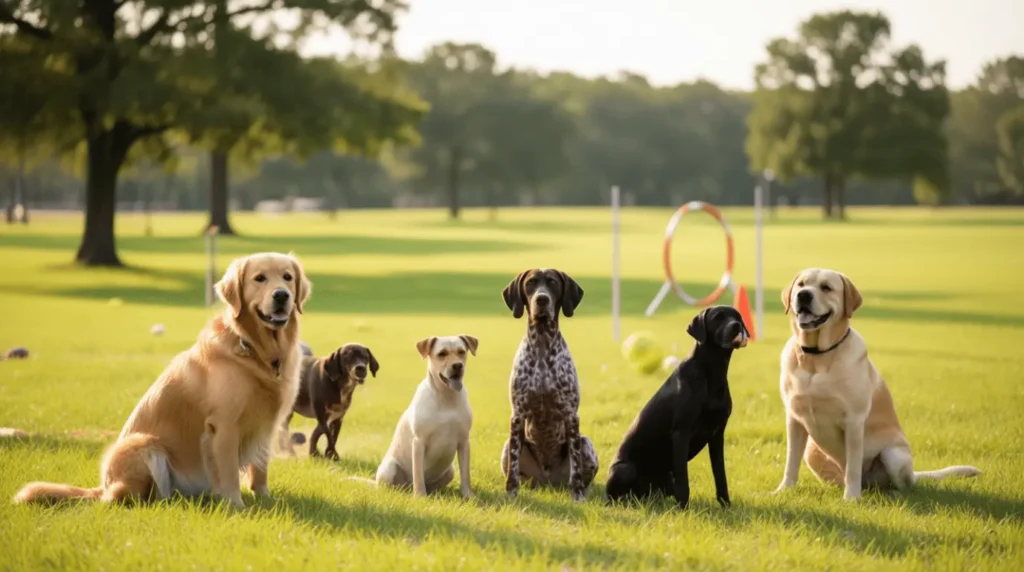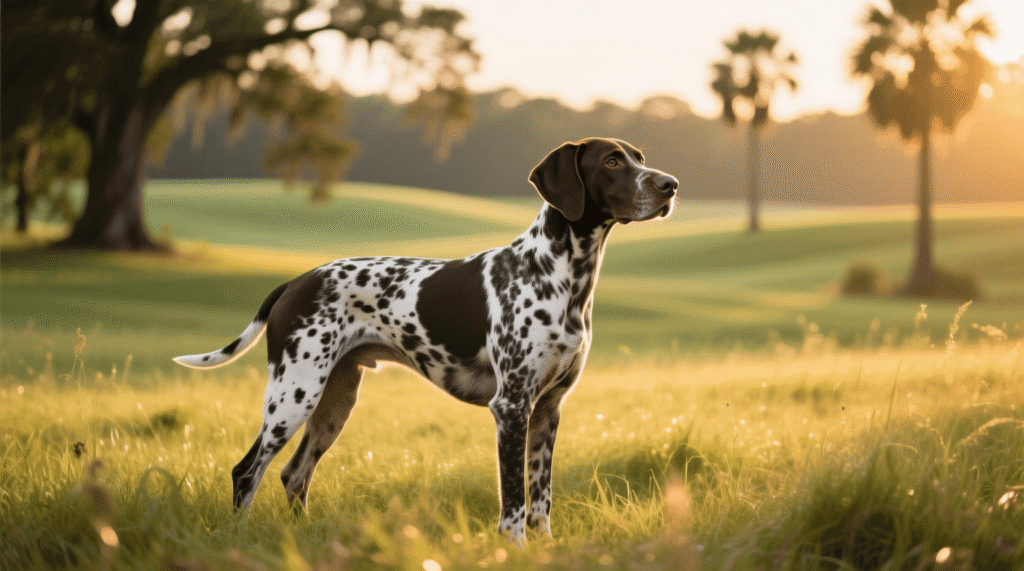The German Shorthaired Pointer (GSP) is a versatile, energetic, athletic breed built for both field work and family life. In South Carolina, with its mix of rural terrain, wetlands, and suburban environments, the GSP can flourish — but only when care is tailored to climate, state laws, and local resources.
A 2020 genetic study of GSPs found the breed maintains relatively low inbreeding and good genetic diversity (genomic inbreeding coefficient ~0.17) — indicating potential for healthy lines when breeding responsibly.
Additionally, a 2023 case report documented a GSP strain developing exfoliative cutaneous lupus erythematosus tied to a UNC93B1 gene mutation, reinforcing the need for vigilance in dermatologic health. This guide is intended for SC owners, prospective owners, breeders, and vets — covering laws, health, training, breeding, environment adaptation, community, and best practices.
Breed Overview & Standard Characteristics
- Origin & Role: Developed in 19th-century Germany to be an all-purpose gun dog — pointing, retrieving, and trailing on land and water.
- Physical Traits: Medium-to-large size; males ~24 in / females slightly shorter; coat short, dense, weather-resistant; colors include solid liver, liver/white, roan, patching.
- Genetics & Diversity: The 2020 genomic study showed the GSP had good levels of genetic variability with relatively low inbreeding.
- Known Genetic Mutations:
Mutation in CLN8 associated with neuronal ceroid lipofuscinosis (NCL) has been documented in a GSP, causing neurological degeneration in one clinical case.Theexfoliative lupus mutation in a UNC93B1 gene was linked to dermatologic and kidney disease in a GSP lineage. - Hyperdontia (extra teeth) has been investigated in GSPs in genetic studies.
- Lifespan & Health Expectations: GSPs often live 12 to 14 years; longevity is enhanced by exercise, diet, and preventive vet care.
Health, Disease & Preventive Care
Common Health Issues
- Hip dysplasia & elbow dysplasia – Hip dysplasia is common in medium/large breeds; screening recommended.
- Bloat / Gastric torsion – risk in deep-chested breeds; best mitigated by feeding smaller, multiple meals and avoiding vigorous exercise right after eating.
- Eye conditions – cataracts, progressive retinal atrophy (PRA) may occur.
- Cardiac diseases – e.g. cardiomyopathy, congenital defects.
- Dermatologic disorders – like familial lupus (observed in GSPs).
- Neurologic diseases – e.g. NCL, noted in GSP with CLN8 mutation.
Health Screens & Testing
Good breeders and owners use both phenotypic (X-rays, physical exams) and genotypic (DNA tests) screening. For example, GSP breeders often follow the GSP Club of America and OFA recommended tests (hip, elbow, eye, cardiac).
Sources like Vickery GSP health pages outline standard tests: OFA, PennHIP, eye exams, cardiac, etc.
Preventive Care in South Carolina
- Annual exams with full labs, including thyroid, heart, eyes, and dental checks.
- Parasite prevention year-round (fleas, ticks, heartworm) especially in SC’s humid climate.
- Skin care because humid summers can aggravate dermatitis.
- Watch weight & fitness — obesity strains joints.
Legal, Licensing & Ownership in South Carolina
State Laws & Dog Regulation
- South Carolina statutes grant counties and municipalities authority to regulate dogs, including impoundment, running at large, and registration.
- Owners must follow rabies vaccination laws; many local jurisdictions require proof before licensing.
- If your dog is deemed “dangerous,” SC law requires registration, liability insurance, confinement and restrictions. scstatehouse.gov
- Cities allow local dog ordinances:
Columbia requires pet licensing, fines up to $200 for noncompliance. - Richland County requires rabies proof and renews annual license tags; unlicensed pets face fines up to $500.
- Sullivan’s Island mandates dog license and rabies tag, with differential fees for residents vs non-residents.
Breeding & Sales Regulations
- Under SC Code § 47-13-160, pet dealers or breeders cannot sell a “registered companion dog” without giving vaccination statements and rights of return under certain conditions.
- Local ordinances may restrict numbers of dogs or require kennel permits (e.g., Columbia limits to three dogs without kennel license).
Owners and breeders in SC must comply with both state law and county/city-specific rules.
Training, Exercise & Behavioral Needs
GSPs are high-drive, intelligent, working dogs. Without adequate training and stimulation, they may become destructive or anxious.

Exercise Requirements
- At least 60–90 minutes of vigorous activity daily (running, fetch, swimming).
- Field work, scent tracking, agility, or hunting maximize their instincts.
- Short bursts of agility, dock diving, nose work improve mental fitness.
Training Approach
- Use positive reinforcement and early socialization (puppy classes, exposure to people/dogs).
- Consistency is crucial—GSPs respond to firm, fair, predictable rules.
- Redirect prey drive with structured tasks — e.g. fetch, scent games.
Behavioral Challenges
- Boredom leads to barking, digging, chewing, or escape attempts.
- High prey drive — caution with small pets unless trained.
- Separation anxiety risk — crate training and gradual absences help.
Grooming & Environmental Adaptation in SC
Grooming
- A short coat needs weekly brushing to reduce shedding and distribute oils.
- Bathing as needed, ear cleaning (due to humidity), nail trimming.
- Skin fold and dewclaw areas inspection.
Climate Adaption
- SC summers are hot and humid. Avoid midday outdoor workouts.
- Provide shade, ventilation, cooling mats, frozen treats when outdoors.
- Ensure freshwater is always available; monitor for heat distress signs.
- Use paw balm in hot asphalt areas.
Habitat & Space
- GSPs thrive with yard space, fenced areas, and daily opportunities for exercise.
- In urban or apartment settings, ensure at least two long walks or runs per day.
Community, Clubs & Resources in South Carolina
- GSP Rescue Carolinas (GSPRC): Rescue and rehoming of GSPs in the Carolinas.
- AKC clubs & field trial groups: GSP owners often join state AKC or local field trial clubs.
- County animal services / shelters: e.g. Greenville Animal Control (rabies tag accepted as license).
Check your county’s animal control or city website for dog licensing, leash laws, breed-specific ordinances, and rescue programs.

Final Thoughts & Recommendations
Owning a GSP in South Carolina means embracing their high energy, mental needs, and physical capability — but also knowing your legal, climate, and health responsibilities.
To summarize:
- Breed is genetically robust, but can manifest serious conditions (dermatologic, neurologic) — require regular vet screening.
- Adhere to SC laws: licensing, rabies, dangerous dog rules, breeding & sale regulations.
- Train, exercise, and socialize early and consistently.
- Groom and manage climate stress when summers are intense.
- Use local resources: rescues, clubs, shelters, and county services.


